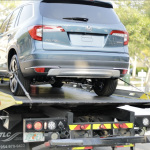Maybe you’ve just got a cracking deal on a car bought off eBay or Autotrader, the only hitch being that it is sitting in Mr Jone’s drive over the other side of the country? Or, you need to get your non-runner moved from A to B? Whatever your reasons, finding a car transport company to get your pride and joy delivered is something that most of us encounter at some point. Although the process is fairly straightforward, it does pay to plan ahead. The following advice and tips should help when choosing a reliable and trustworthy car transport firm.
Service Type
There are 3 main service types available to you when transporting your car, each of which carries their own pros and cons, these will be discussed in turn.
1) Have the car driven on trade plates
2) Have the car transported on a single car trailer
3) Have the car transported on a multi-car trailer
Having the car driven on trade plates by a professional can often be the cheapest option for car delivery. However, you are adding mileage onto the car and there is an increase in the chance of damage when compared with the other main methods whereby your vehicle is trailered.
Single car trailers are generally used for the more urgent vehicle deliveries, accordingly, however as only one car is moved at a time it also tends to be the most expensive. There are a wide range of single car trailers on the market, from simple open-tops to those that are enclosed and even climate controlled. You may wish to insist upon an enclosed trailer if your vehicle is of particularly high value or is irreplaceable, but expect to pay a premium.
Multi-car trailers can transport several cars at once, whilst the service will be slower you can expect a lower price. Cars are being transported on multi-car trailers everyday and if there is spare capacity on a route a vehicle transport firm is already travelling you could get a great price. As multi-car trailers are harder to manoeuvre than single-cars, it is often the case that vehicle transport firms will not deliver to the door, but rather to a local hub where the vehicle can then be collected from. So, it is worth checking that out prior to accepting any offer.
Getting Prices
Like any service, you wouldn’t just accept the first price quoted so it pays to shop around. Aim to get at least 5 quotes for your job.
Insurance
One of the most important things to do when choosing a car transport company is to check their insurance documents. If they are not adequately insured you run the risk of not only their transporter being impounded but also your own vehicle. Plus of course, in the event of an accident you will want the peace of mind that your vehicle is adequately covered. Policies can differ from company to company, but the key areas you will want to look for are the value of the level of cover as well as cover for both damage and theft.
Your own car insurance policy may already have cover for your vehicle whilst in transit, so it is certainly worthwhile checking that. Some insurance firms do also allow you to add this option to your insurance for a fee. Having this option available to you as a back-up should the worst happen and the car transport firm fail to claim is worth it for the peace of mind alone.
Establishing the trustworthiness of the car transport company
So, you’ve got a great price & their insurance cover is fine, but how do you know that they are reliable & have adequate experience. It is worth conducting a search on Google for reviews of the company so you can see what previous customers have said about their services. The car transport firm should also be able to offer you testimonials. At the end of the day, it is up to them to prove to you that they are trustworthy. If they find it hard to do that, they probably aren’t the right ones for you.
Payment Terms
Now that you have chosen your car transport firm, it is normal practice to be required to pay a deposit, but this should not exceed 25% of the total cost. Usually cash or check is accepted as payment, however using a credit card is your best option in case you need to dispute charges at a later date.
Go through contract
Verbal promises mean nothing. Make sure that everything is down on paper in black and white. If you are uncertain about any clauses, ask the firm and get them to re-draft it if necessary. There should be a clause whereby you are compensated if they fail to deliver within the specified timeframe.
Preparing car for transport
Once you have agreed dates, signed the paperwork and paid your deposit, you will need to prepare your car for transport. Don’t leave this until the last minute. Your transporter will no doubt offer you tips as well, but be sure to check for and document any pre-existing damage by following these steps:
1) Wash the car thoroughly.
2) Make a written note of any chips, dents or other cosmetic damage whatsoever.
3) Take photos of the car from several angles as well as close-ups of any damage.
4) Date the photographs and written record.
Be certain to remove any personal items from the car (including the boot), these generally won’t be covered by insurance should they go walk about. Also any extra weight could potentially cause damage to the cars undercarriage whilst in transit as well as other vehicles if on a multi-car trailer.
Unless the car you are getting moved is a complete write-off you should check it for any mechanical problems. Although your car will be driven very little (if at all), you should try to ensure that it is running as best it can to help prevent any time delays or damages.
1) Check the battery is fully charged & tyres are fully inflates.
2) Top-up all fluids in the car but try to run down the petrol tank to about ¼ full which will help save on weight.
3) If you have spotted any leaks or mechanical issues, be sure to let car carrier know. If you car is going on a multi-car trailer it should be placed on the bottom rack to prevent spilling on cars below.
Finally, if your car is a soft-top be sure that it is securely down. Fold back your wing mirrors & retract the radio antennae. Remove/hide any items that could catch the eye of thieves such as cd players/sat nav. Also, be sure to disable your car alarm prior to pickup, if that’s not possible be sure to tell your car transport company how to turn it off should it be triggered.
What to expect from the car transport firm on pickup/delivery
Before releasing your vehicle make sure you have made a record of any pre-existing damage including time-stamped photos. When the company arrive, they will inspect the vehicle with you and note this damage on their own records, make sure that any/all damage is recorded there before signing.
Before loading up your car be sure to check the mileage indicator, although your car may be driven a little to load/unload it, there should be no major increase in mileage between pickup and delivery.
When your car is delivered, inspect your car slowly and carefully. Do not rush this step or sign anything yet. Check for any new damage (including roof and bumpers) or increase in mileage. If there are any inconsistencies, you should document these and get the driver to sign it. Only once you are happy and the driver has signed to acknowledge for any new damage should you sign acceptance. If you do not follow these steps it is unlikely you will have recourse at a later date.
In the unlikely event that new damage has been caused in transit, you should file a claim with the car transport company and follow their usual procedures. You should also file a claim with your own insurance company within 24 hours.
Post Delivery
The vast majority of car transport transactions go smoothly, however if there were any problems, first try to iron these out with the firm directly. They usually work on a referral basis and so really do want to resolve any issues that have arisen. If you had tried but feel you are not getting anywhere, you may want to file a complaint with agencies such as trading standards.




